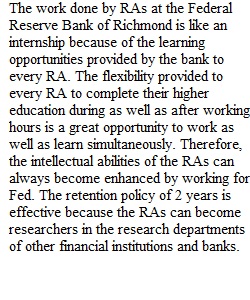


Q Case Discussion 16: Federal Reserve Bank of Richmond The Federal Reserve Bank of Richmond (hereafter the Richmond Fed), like all other regional banks in the Federal Reserve System, has a Research Department staffed mainly by workers who hold PhDs in economics. These economists conduct research on monetary policy. They are assisted by research assistants (RAs), who help with statistical analysis, data collection, computer programming, producing figures and tables, and conducting literature reviews. RA jobs are entry-level positions designed for new college graduates, typically with majors in economics. High-quality RAs play a critical role in the research process, and their hiring is taken very seriously by Fed economists. High levels of intrinsic motivation are desirable, i.e., RAs who voluntarily go the extra mile, work long hours, sometimes come in on weekends, etc. Successful RAs are most often new college graduates who expect, themselves, to ultimately go back to school to get PhDs in economics or other advanced degrees, and who use the Fed RA job as a stepping stone. Successful applicants for RA positions usually went to elite college and universities, graduated with high GPAs, and majored in economics or related fields. RA salaries are market competitive but lie well below those in entry-level positions in investment banks and management consulting firms, even though most people who accept jobs as Fed RAs could also have worked in those other types of firms. The Fed offers a generous education benefit that pays for RAs to take courses (after hours, and sometimes even during work hours) at local universities, in areas such as economics, math, statistics, and computer programming, that relate to the job description. An unusual feature of the Fed RA job description is that it is only a 2-year position. Even if an RA has a tremendously strong job performance, the Fed does not retain the person at the end of 2 years. This policy is interesting because it only applies to RAs (and not to other jobs within the Fed) and because it takes time for a new college graduate to learn to become an effective research assistant, and by the time they are fully trained and up to speed, it’s about time for their 2-year term to end. 1. Consider the “sorting effect”, and explain how the education benefit affects the pool of RAs via hiring and retention. What types of workers are attracted to the job, and are these the workers the Fed research economists want to attract? 2. Consider the “sorting effect”, and explain how the 2-year restriction affects the pool of RAs via hiring and retention. What types of workers are attracted to the job, and are these the workers the Fed research economists want to attract? Is the 2-year rule a sensible policy? Explain. 3. How does the fact that the job only lasts 2 years affect a job applicant’s thought process when comparing the job to others that are “permanent” in other firms? 4. If the education benefit (or the 2-year restriction) were introduced recently, as new policies, would either of them induce “incentive effects”? Explain. 5. If either the education benefit or the 2-year rule were eliminated, how (if at all) would you expect the salary to be affected? Explain.
View Related Questions